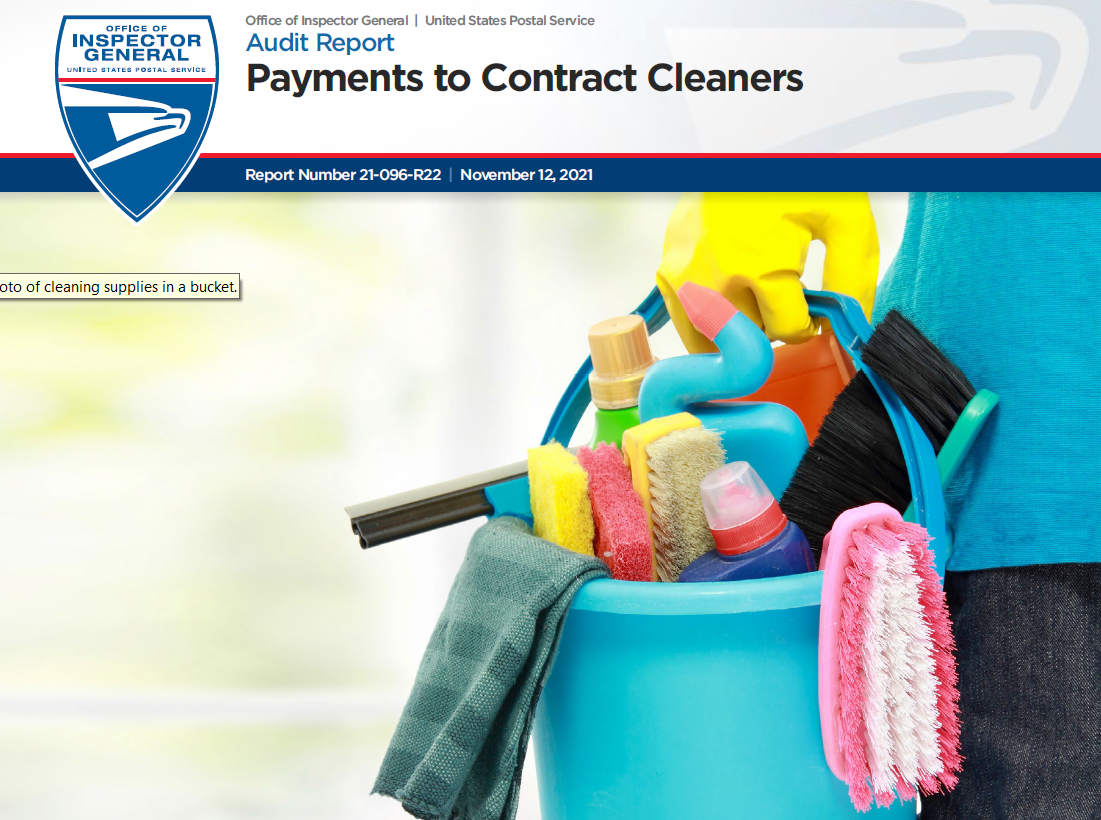
Objective
Our objective was to determine whether Postal Service payments to contract cleaners were valid, timely, and made in compliance with Postal Service payment policy.
The Postal Service contracts with external service providers to clean eligible postal facilities. The two methods for procuring cleaning services are dependent on the value of the estimated cleaning service. Specifically:
- Local cleaning service agreements are procured and awarded by a postmaster or officer-in-charge of the postal facility if the annual cleaning service is less than:
–$10,000 and the cleaning is performed by a self-employed cleaner, or
–$2,500 and a service company performs the cleaning.- When the annual cleaning service is above those annual dollar amounts, Postal Service Category Management Center (CMC) contracting personnel procure and award a contract for the cleaning services.
During fiscal years (FY) 2019 and 2020, about 4,200 postal facilities, out of a total of about 34,600 postal facilities had contract cleaners. The Postal Service paid contract cleaners $99.5 million during that time period. We reviewed 205 payments to self-employed cleaners and 6 payments to CMC contactors.
Findings
Payments to contract cleaners were not always valid, timely, or in compliance with payment policy. Regarding local cleaning service agreements, the Postal Service did not always comply with payment policy for local cleaners. Our sampled transactions showed:
- 98 instances where postmasters did not complete or retain required documentation for establishing and managing local cleaning agreements.
- Eight instances where the self-employed cleaner who signed the agreement did not perform the cleaning services, as required by policy.
- Seven instances where postmasters or officers in charge did not submit required documentation to suspend or renew payments timely, including:
- Two instances where cleaners who did not report to the postal facility to clean for two and five days, respectively, during a two-week period but the postmasters or officers in charge did not submit a request to reduce the payments for the missed days, and
- One instance where a cleaner stopped reporting to a facility, but the postmaster did not submit the required documentation to stop automatic payments timely, and
- Four instances where postmasters did not complete the renewal documentation timely, so payments to the self-employed cleaners stopped even though they continued to work.
- A postmaster established a local cleaning agreement with a self-employed cleaner who shares a residence and checking account with the postmaster.
In addition, postmasters at three postal facilities did not follow Postal Service policy when they granted contract cleaners access to the workroom floors to clean when Postal Service personnel were not on duty.
These issues occurred because postmasters were either unaware of policy requirements or relied on procedures set up by previous postmasters that were not consistent with policy requirements. In addition, local cleaners were not used at all postal facilities and postmasters did not often establish and renew local cleaning agreements. Further, Purchasing Shared Services Center personnel support post office operations and provide guidance on policy, but policy did not have implementing guidelines needed to address specific field situations.
Because the Postal Service did not always comply with policies for local cleaners, we consider $23,428 unsupported questioned costs.
Regarding CMC contracted cleaning services, Contracting Officer Representatives (COR) responsible for approving cleaner invoices did not always validate that the work was performed before approving them for payment. CORs rely on postmaster-provided missed service days reports to validate the supplier invoice information. However, postmasters do not always notify CORs of missed service days, which increases the risk of paying cleaners for work they did not perform. We did not identify policies or procedures that outline specific COR or postmaster responsibilities for overseeing CMC cleaning contracts.
As a result, the Postal Service cannot ensure that persons other than those who signed local agreements completed required safety training. If issues arise with the cleaner, maintaining required documentation supports a postmaster’s decision to terminate agreements. Also, when contractors access the workroom without Postal Service employee oversight, there is an increased risk that mail is not safeguarded.
Recommendation
We recommend management:
- Update and clarify local cleaning polices to include implementing guidelines for specific field situations; and communicate the updated policies and guidelines to postmasters at least annually, given the movement of personnel within the postmaster category.
- Direct postmasters to review and comply with policy requirements on access codes and keyed locks.
- Update and communicate policies and procedures for processing and paying contract cleaner invoices, to include validating the performance of contractor custodial services under CMC issued orders and procedures for postmasters or officers-in-charge to report missed service days.
Read full report
Source: USPS Office of Inspector General
